The CASMI Fellowship offers an attractive opportunity to engage with others committed to advancing medical innovation to address unmet clinical need faster and more productively.
CASMI fosters an international network of individuals drawn from various institutions, industrial, as well as academic sectors. The collaborative network facilitates fundamental research into the process of medical innovation and how barriers might be addressed and seeks to influence the policy and regulatory environment.
CASMI builds links between the Fellows through partnering on National meetings on topics of contemporary interest, the highly acclaimed Ignite programme and other educational initiatives, highlighting reports, relevant blogs and policy initiatives that have demonstrable impact on medical innovation.
- Definition and criteria to become a CASMI fellow
CASMI recognises two categories of Fellow:
Foundation Fellows
Foundation Fellows are Fellows who helped found CASMI and are recognised for a significant contribution to the field of medical innovation relevant to CASMI’s activities (both academic and non-academic activities). They are characterised as high achievers who demonstrate a track record of contribution, or capability for future contribution, to the CASMI agenda.
For academic Fellows this might entail a record of CASMI-relevant publication as a principal Investigator, demonstrating leadership and innovation within a relevant field (e.g. with academic outputs that might be expected from 5 years post-doctoral work at a suitable level).
For non-academic Fellows (e.g. from an industry or regulatory background), an equivalent level of seniority and achievement is evident with contributions in terms of the practice of medical innovation and its regulation, or leadership in a field relevant to CASMI’s goals.
Fellows
Since 2020 we have opened the Fellowship to a broader constituency reflecting a desire to involve those committed to medical innovation at an earlier and more formative stage of their career as well as established professionals.
We consider applications from those involved in postgraduate work or research relevant to the field who are willing to fulfil the expectations of the role.
- Expectations of CASMI Fellows
- Act as ambassadors for CASMI and to encourage broader engagement from colleagues wherever possible.
- Actively participate in discussions on the strategic direction of CASMI and its initiatives.
- Assist in developing working collaborations across UCL and other relevant institutions.
- Cite CASMI in publications or presentations on work done in collaboration with CASMI or on topics relevant to its agenda.
- Produce written material relevant to their field of expertise for inclusion on the CASMI website. This might include short reports of CASMI related work (e.g. ongoing research or implementation/development projects) they are engaged in for a section of the website that showcases ongoing projects.
- Contribute to CASMI education and training events.
- Enhance or not undermine the reputation of CASMI by their personal or scientific conduct. Fellowship is dependent upon upholding this expectation in particular.
- Benefits for CASMI fellows
Preferential invitations to CASMI events and associated meetings. Potential discounted attendance at CASMI events. Membership of a network focussed on medical innovation that offers peer support and encourages new collaborations and opportunities for the development of research projects. Opportunity for participation in special commissions (e.g. Lancet series). Showcase their collaborative work through the CASMI website. Access to CASMI Members Site offering a range of tools/approaches and forum for discussion.
CASMI Foundation Fellows
- Professor Robert Horne
Profile coming soon
- Professor Michael Parker
- Michael Parker is Director of the Wellcome Centre for Ethics and Humanities at the University of Oxford. His main research interest is in the ethics of collaborative global health research. Together with partners at the Wellcome Programmes in Vietnam, Malawi, Thailand-Laos, Kenya, and South Africa he co-ordinates the Global Health Bioethics Network - www.globalhealthbioethics.net - which is a programme to carry out ethics research and build ethics capacity. From 2018 - 2020 Michael chaired the Nuffield Council on Bioethics Working Group on the ethics of research in global health emergencies. Michael’s other research interest is in the ethical aspects of the clinical and research uses of genomics and data science. He is Chair of the Ethics Advisory Group for the 100,000 Genomes Project and a non-executive director of Genomics England. Michael is also an ethics advisor to UK Biobank and co-chair of the ethics advisory committee for the International Common Disease Alliance.

- Professor Quentin Pankhurst
- Quentin Pankhurst is a Professor of Physics and Director of the UCL Healthcare Biomagnetics Laboratory. Previously, in 2008, he was the Director of the Davy-Faraday Research Laboratory at the Royal Institution of Great Britain (in Mayfair, London). On his return to UCL in 2011, he set up the UCL Institute of Biomedical Engineering, a cross-faculty institute focused on translational research and experimental medicine.

Quentin’s translational research is directed towards applications of magnetic nanoparticles in healthcare. To date he has published 230 papers that have been cited 14,000 times, and he has generated £58M in grant income and investment. He is a co-inventor on 12 patent families with 80+ national filings covering magnetic sensing, heating and actuation; and he is the co-founder of three spinout companies: Endomagnetics Ltd (Apr. 2007); Resonant Circuits Limited (Sept. 2009); and MediSieve Ltd (Apr. 2014). Together, these companies employ 45 full-time staff and support a further 10 FTE in the supply chain; and one of them, Endomagnetics Ltd, recorded 45% growth and a turnover of £9.0M in 2018/19.
Quentin was born and raised in New Zealand, and has lived in England since 1983. He is married and has two daughters.
- Professor Rosalind Raine
- Rosalind is Professor and Head of the Department of Applied Health Research at UCL, a public health medicine doctor, Director of NIHR* ARC North Thames (Europe’s largest partnership of world leading applied health and care researchers) and Vice Director of NIHR Cancer Policy Research Unit.

She is recognised as a world leading applied researcher with expertise in the evaluation of major health service/ public health change, of digital health innovations and of determinants of widespread implementation of evidence based care. She integrates diverse techniques including complex data analysis and ethnography to examine the impact of health/public health interventions on health outcomes, health inequalities, health care quality and costs.
Rosalind is an elected member of NIHR Strategy Board and of the Lancet Commission on The Future of the NHS. She advises on health policy internationally, nationally and regionally; chaired the UK Heads of Academic Departments of Public Health (representing Departments at over 30 universities), and sat on the HEFCE Research Excellence Framework Panel (whose recommendations inform the distribution of Government funding to UK universities).
She was selected by the British Medical Association as one of 29 national role models in academic medicine and by NIHR as one (of just six) of the countries ‘leading edge scientists’. She has also been selected as an NIHR Senior Investigator.
*NIHR is the largest health research funder in the UK
- Professor Rachel Batterham
- Professor Rachel Batterham is Professor of Obesity, Diabetes and Endocrinology at University College London (UCL). She holds a prestigious National Institute of Health (NIHR) Research Professorship (2016-2021). She established and leads the University College London Hospital (UCLH) Bariatric Centre for Weight Management & Metabolic Surgery. She leads the UCL Centre for Obesity Research within the Department of Medicine and is the Director for the UCLH/UCL NIHR Biomedical Research Centre Obesity Research Theme.

Professor Batterham laboratory’s research is focused on increasing our understanding of body weight regulation and developing new therapies for the treatment of patients with obesity and type 2 diabetes. She has received several international awards including the Andre Mayer award from the World Obesity Federation (2016), the Diabetes UK Rank Fund Nutrition Prize (2015), the Lilly Scientific Achievement Award from The Obesity Society (2014), and the Linacre Medical from the Royal College of Physicians (2010).
Professor Batterham has made significant clinical contributions to defining the management of obese patients through her membership of the NICE Obesity Guideline Development Group and Royal College of Physicians Advisory Group on Health and Weight. Professor Batterham is currently a NICE Clinical Expert (2016-2021), Scientific Chair for the International Federation for Surgery for Obesity and Metabolic Diseases (IFSO) European Chapter (since 2015), a Trustee for the Association for the Study of Obesity (since 2016) and Council Member for British Obesity and Metabolic Surgery Society (since 2016).
- Professor Mark Cunningham
- Mark Cunningham is Professor of Neuronal Dynamics in the Institute of Neuroscience at Newcastle University and an Honorary Research Fellow position in Clinical Neurophysiology (Royal Victoria Infirmary, Newcastle NHS Trust).
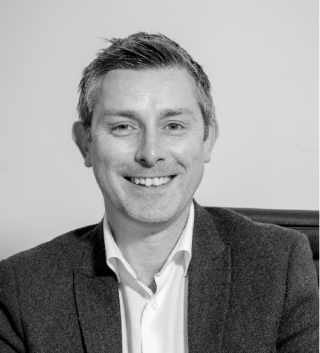
He is a recognised expert in the application of electrophysiological techniques to study neuronal networks. His research focuses on understanding the generation of synchronised activity in brain networks of relevance to disorders including epilepsy and cognitive dysfunction. Mark sits on the Scientific Advisory Committee for Epilepsy Research UK, and has acted on advisory boards and as a consultant to numerous pharmaceutical companies.
- Christopher Exeter
- Christopher Exeter is a Director in the research group at UnitedHealth Group, where much of his work involves using data to re-engineer healthcare through research, innovation, prevention and patient empowerment. Recent work has involved research to understand public attitudes to data for health research – both formal (medical records) and informal (data from wearables, AI, for example).
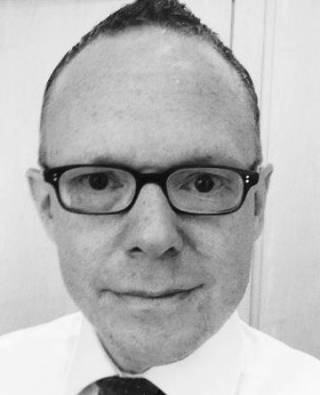
Previously, he was a Fellow in the Department of Surgery & Cancer at Imperial College London, where his work focused on interventions to prevent non-communicable disease. He also developed an app to screen for blood pressure: the aim being for mass screening in public places in order to identify individuals with elevated blood pressure or at risk of hypertension. Prior to that, he was a civil servant at the Department of Health, where he held a number of policy roles.
- Professor Liam Grover
- Professor Liam Grover is a bio materials scientist, from the School of Chemical Engineering at the University of Birmingham, whose work has a strong focus on the development of novel medical technologies and their translation into the clinic. At present he is working on two projects that are focussed on moving protein-based pharmaceutics into use on the surface of the eye and skin (funded by Wellcome and MRC DPFS at a total values of £4.3m). He is also working with the military on therapies for the formation of pathological bone deposits and with the maxillofacial reconstruction department to reduce the rate of implant related infection. His strong track record in developing a translational pathway for these technologies has supported the University of Birmingham to fund the establishment of a research institute within the Institute for Translational Medicine at the University Hospital Birmingham, which focusses on the translation of Healthcare Technologies (Healthcare Technologies Research Institute – HTRI). Professor Grover would like to establish the HTRI as a leading light in the translation of medical technologies.
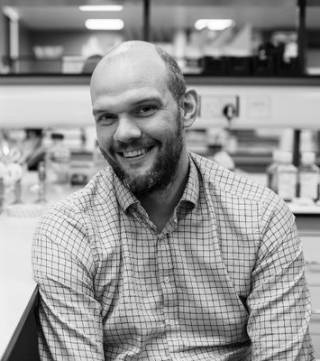
- Professor Alun David Hughes
- Alun Hughes is currently Professor of Cardiovascular Physiology and Pharmacology at UCL Institute of Cardiovascular Science. He is Head of the Department of Population Science & Experimental Medicine in the UCL Institute of Cardiovascular Science, and Associate Director of the MRC Unit for Lifelong Health and Ageing at UCL. He is also a visiting professor at the National Heart & Lung Institute, Imperial College London, the Menzies Institute for Medical Research, University of Tasmania & the Department of Pharmacology, University of Aarhus, Denmark.
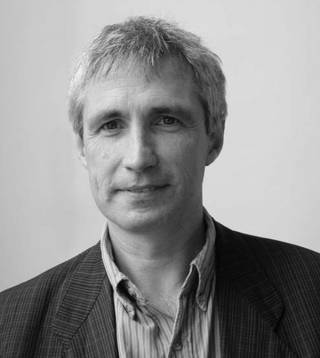
Professor Hughes completed his medical degree (MB, BS) at St Mary's Hospital Medical School in 1983 having obtained a 1st class intercalated BSc degree in Physiology in 1979. He was awarded a PhD from the University of London in 1988 for his work on vascular dopamine receptors. Subsequently he was a Medical Research Council Training Fellow at St George's Hospital Medical School, a British Heart Foundation Intermediate Fellow, Senior Lecturer/Reader and subsequently Professor of Clinical Pharmacology at Imperial College London before moving to UCL.
Professor Hughes was Secretary of the British Hypertension Society from 2004 -2008, President of the European Council for Cardiovascular Research from 2008-2010, and is currently a faculty member and hononary Professor of the Danish Cardiovascular Research Academy (DaCRA).
- Professor Zisis Kozlakidis
- Dr Zisis Kozlakidis is a virologist, Chair of the Centre of Excellence in Infectious Diseases (BBMRI.uk); President of the International Society of Biological and Environmental Repositories (ISBER) and Faculty at the Cass Business School, City University teaching on Medical Leadership and Innovation. Zisis completed a PhD in Microbiology at Imperial College London followed by substantial working experience in the design of viral diagnostics. His expertise in viral diagnostics was acknowledged by being elected a Turnberg Fellow (2014), UK Academy of Medical Sciences and Fellow of the Linnean Society (2015), Royal Academy of Sciences.

Zisis has significant expertise in the archival preservation of viral species and biobanking. He is currently the President of ISBER and has provided operating feasibility advice on such facilities in a number of different countries including Germany, the USA, Saudi Arabia, Vietnam, Indonesia and China.
His current work overseen by the Department of Health at UCL involves the development and integration of next generation genomics in routine healthcare, and their associated financial impact(s) establishing their sustainability and long-term success. His contribution in the financial modelling of new healthcare operating models was recognized by the awarding of an Executive MBA degree by Cass Business School, City University (2015).
- Navin Ramachandran
- Dr, Navin Ramachandran is a practising radiologist at UCLH NHS Foundation Trust, an Honorary Senior Lecturer at UCL CHIME, a member of the board of directors at The IOTA Foundation and an advisor to the UK All Party Parliamentary Group on Blockchain. His current research interest centres on data integrity in healthcare, its overlap with artificial intelligence and the role of semantic interoperability.
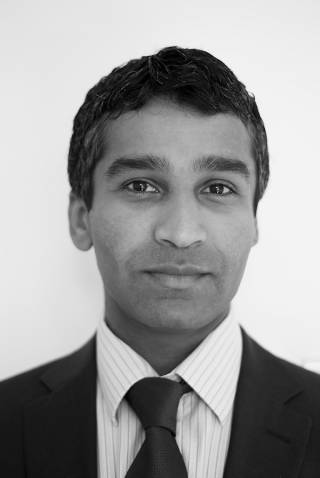
- Professor Anne Schilder
- Anne Schilder is an NIHR Research Professor at the UCL Ear Institute and Director of the NIHR UCLH BRC Deafness and Hearing Problems Theme. As joint Co-ordinating Editor of Cochrane ENT, National Lead of the NIHR Clinical Research Network ENT Specialty and Surgical Specialty Lead for ENT of the Royal College of Surgeon’s Clinical Trials Initiative, she plays a pivotal role in clinical research in ENT, Hearing and Balance in the UK.
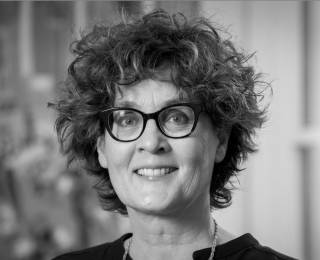
Her current research focuses on hearing loss, a condition that affects one in six people in the UK and has a major impact on their physical, mental and social health. Hearing loss acquired in mid-life has recently been identified as a significant risk factor for dementia. Based on recent discoveries in the mechanisms of hearing loss, and supported by major public and private funds, a range of novel drug, gene and cell therapies are being developed to protect, restore and regenerate the hearing system. Anne’s research focuses on the translational aspects of applying these innovative hearing approaches in existing healthcare systems, and ranges from first-in-man trials, analysis of routine health data, to health economics and health policy.
Current hearing pathways do not meet the needs of people with hearing loss; there is variation and inequity in NHS hearing services, and current treatments, hearing aids, do not work well in natural (noisy) environments. My team works closely with patients, hearing scientists, clinicians and industry to develop and test novel hearing treatments and make sure that NHS patients will have access to these innovations.“
- Professor Andrew J Krentz
- Andrew Krentz has combined clinical diabetes & endocrinology with drug development focused on cardiometabolic disorders. His current interests include precision diagnostics and therapeutics, clinical decision support using augmented intelligence, and healthy longevity solutions.
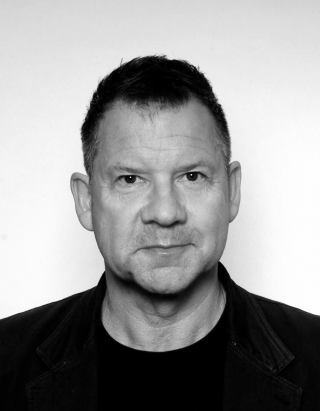
Andrew serves on the Medical, Scientific & Research Committee of Heart UK and is an elected member of the Vascular, Lipid & Metabolic Medicine section of the Royal Society of Medicine. He is accredited as a clinical specialist by the European Society for Hypertension.
Andrew is the founding Editor-in-Chief of Cardiovascular Endocrinology & Metabolism.
He holds the position of Visiting Professor of Medical Sciences at the Institute of Cardiovascular & Metabolic Research, University of Reading, UK and is a Senior Research Fellow at ProSciento, USA. Senior appointments have included: Professor of Endocrinology & Metabolism and Director of the Institute of Translational Medicine, Clore Life Sciences preclinical research laboratory, University of Buckingham, UK (2016-17); Visiting Professor of Medicine, Institute of Diabetes for Older People, Bedfordshire & Hertfordshire Postgraduate Medical School, University of Bedfordshire, UK (2011-14); Senior Director for Scientific Services, ProSciento, USA (2011-2016); Consultant Physician in Diabetes & Endocrinology, Southampton University Hospitals (1995-2009); Senior Clinical Lecturer, University of Southampton, UK (1997-2009); British Heart Foundation International Research Fellow, University of California San Diego, USA (2004-5).
In 2019 Andrew was awarded honorary Fellowship of the Faculty of Pharmaceutical Medicine of the Royal College of Physicians in recognition of his contributions to pharmaceutical medicine.
- Professor Andrew Dick
- Professor Andrew Dick qualified in medicine also with a degree in Biochemistry (BSc (Hons)) from the University of London, and during his medical education he also undertook an MRC research associate position in Biochemistry with Professor Coleman in Yale. Following training in internal medicine and MRCP he entered ophthalmology residency and obtained his postgraduate research degree in Immunology in 1993 at the University of Aberdeen. He underwent an MRC Post-Doctoral Fellowship to work with Jon Sedgwick at the Centenary Institute of Cancer Medicine and Cell Biology in Sydney Australia. His clinical expertise is in medical and surgical management of inflammatory disorders of the eye.
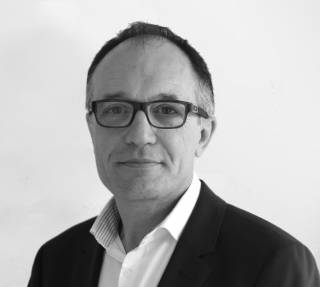
His research spans the basic and translational science conduit to early phase trials in inflammation as related to autoinflammatory, autoimmune and degenerative retinal disease. He has led pivotal experimental studies and clinical studies for the use of biologics and principally anti-TNF in ocular inflammatory diseases. The labs have been instrumental in the understanding of inflammatory cell kinetics during ocular inflammation in murine models, immune contribution to tissue damage and in particular macrophage biology and the control of macrophage activation and regulation of homeostasis.
Professor Dick is a Fellow of the Academy of Medical Sciences in the UK for his significant contribution to research and scholarship, in particular his development of molecular targets and biologic therapy for inflammatory eye disease and was awarded the Alcon Research Institute Research award in 2011.
Prior to becoming Director of institute of Ophthalmology, the UCL-Institute of Ophthalmology, he was Director of Research for the Faculty of Medicine and Dentistry at University of Bristol. He has previously been Editor of British Journal of Ophthalmology, President of European Vision and Eye Research (EVER), Master of Oxford Ophthalmological Congress and currently Vice-President of ARVO.
- Dr Jo Gibbs
Profile coming soon
- Dr Xiao Liu
- Dr Xiao Liu received the Ph.D. degree from University College London (UCL), London, U.K. He is currently a Lecturer with the Department of Electronic and Electrical Engineering, UCL. His group works on analogue and mixed-signal circuit design for biomedical applications, neuroprostheses, microelectronic sensors, microsystems and wearable technologies. Several of his devices has gone through animal tests and are now in the phase of clinical trial. His patented sensor technology on adherence monitoring for inhaled therapy has been commercialized to industry.
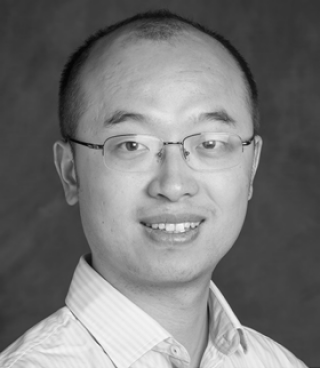
Dr Liu holds a UKRI Innovation Fellowship awarded by the UK Engineering and Physical Science Research Council (EPSRC). He is an Associate Editor for the IEEE TRANSACTIONS ON CIRCUITS AND SYSTEMS I: REGULAR PAPERS. He is a Chartered Engineer and a member of the Biomedical and Life Science Circuits and Systems Technical Committee of the IEEE Circuits and Systems Society.
Dr Liu’s research interests:
Custom microchips for biomedical applications, lab on a chip and point-of-care devices, microelectronic sensors and microsystems and wearable technologies.
Collaborative interest areas:
Implanted devices and microsystems for neurologically impaired patients, drug delivery, wireless sensing and wearable technologies for both medical and consumer applications.
- Dr Nikhil Sharma
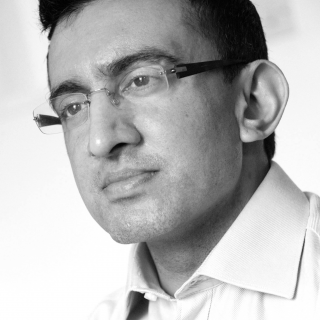
Nik Sharma qualified from the University of Liverpool and was awarded a PhD by the University of Cambridge. His thesis examined neuroplasticity and neurodegeneration of the human brain. After Cambridge, he was awarded an NRSA fellowship to work at the National Institute of Health (NIH), Bethesda, USA. His lab combines different techniques and approaches to understand neurodegeneration and neuroplasticity of the motor system in ‘real world’ people living with motor neuron disease(thesharmalab.com). More recently the lab has begun to explore the link between the gut microbiome and the microglia and is carrying out the first trial of a faecal microbiome transplant (FMT) in people living with MND (BIOMAX-ALS).
Nik is a self-taught coder and has an interest in the use of technology and A.I. to assess clinical progression. He also explores the use of distributed ledger technology (blockchain) to facilitate data sharing. He collaborates with a number of start-ups and ‘unicorns’ in this space.
- Professor Geraint Thomas
- Geraint Thomas is a Professor of Biochemistry in the Research Department of Cell & Developmental Biology at UCL. Geraint has a deep interest in interdisciplinary approaches to biosciences research and education and their coherent integration. He is especially keen on the approaches of quantitative, computational and physical sciences having applied them all in his own research. He is heavily committed to researcher development at UCL and more widely across London and the UK through his work with UKRI-BBSRC’s largest doctoral programme, the LIDo DTP and the council’s People and Talent Strategic Advisory Panel, as well as the new UK Food Systems CDT and the associated Food Systems Academy (both launching in 2021). He has also led the SysMIC project and consortium since its inception in 2011 and the training of over 3,000 active researchers in academia, institutes and industry in computational modelling for biological and biomedical applications. Geraint’s own research currently focuses on hyperspectral imaging (principally Raman) applied to problems in pathology and fundamental biosciences. He is especially active in tech development for diagnostics and new research device platforms and is working with academia, research institutes and industry. Other research with industry is focused on super-resolution molecular separation technology for computer controlled biochemical reactions.
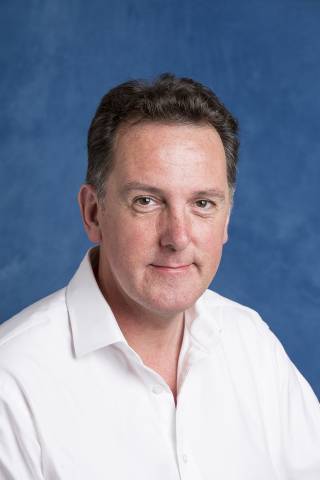
- Dr Stuart Faulkner
- Stuart’s 17-year career in biomedical science has spanned a PhD in Developmental Neuroscience at Cardiff, Wales. A post- doctorate at University College London, focused on the pre-clinical validation of new treatments for perinatal brain injury, and an early phase clinical trial. A four-year move to Toronto, focused on research into stem cell treatments for cerebral palsy, before moving into interdisciplinary work within orthopaedics.

For three years Stuart was the Oxford lead for CASMI. Here he also co-lead a variety of interdisciplinary consultancy and policy projects for industry, patient organisations, governmental departments and research funders looking at the multi-stakeholder dimensions of enablers and barriers to sustainable medical innovation in healthcare, including the UK’s Accelerated Access Review. Stuart has co-lead work across large EU private-public partnerships on adaptive pathways for medicines development under the Innovative Medicines Initiative (IMI).
Stuart’s current work continues in the department of Primary Healthcare Sciences at Oxford University where he is co-lead on a number of work streams in a new EU IMI project PARADIGM - enhancing sustainable patient engagement across the life cycle of medicine development. Additionally Stuart is co-developing an MSc course in translational health sciences, starting in 2020.
- Professor Richard Barker
Profile coming soon
- Dr Suzanne Li
Profile coming soon
- Dr Liz Morrell
Profile coming soon
- Dr Elin Haf Davies
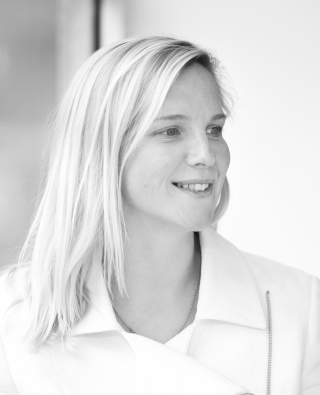
Elin Haf initially qualified as a Children’s nurse at Great Ormond St Children’s Hospital (GOSH), going on to gain a BSc (Neuroscience) and MSc (Research Methods). After years of recruiting children to clinical trials Elin embarked on a PhD at the Institute of Child Health (UCL) to develop a clinical outcome measure and biomarker of ataxia in children with neuro-metabolic disease.
Elin Haf was part of the paediatric team at the European Medicine Agency from 2007-2013, responsible for implementing the Paediatric Regulation in Europe. She has a personal interest in empowering children to become involved in the health / research agenda.
In January 2015 Elin Haf launched her own company, Aparito. Using mobile phone apps and wearable technology to monitor disease progression and patient well-being in real-time. The company now has studies running in the UK, India, America, across.
Field of work and collaborative interests are: innovative study designs, digital tool, digital biomarkers, patient engagement, decentralised trials.
- Dr Nick Fahy
- I am a researcher and consultant in health policy and systems, looking at how health systems work; what we can learn by comparing health systems across countries; and how to bring about constructive change in health systems.
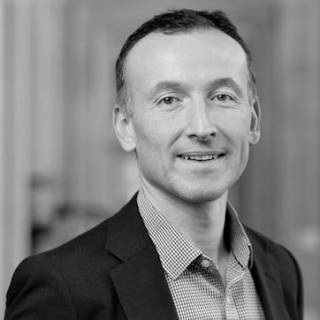
My background is in international health policy, including over a decade in the European Commission, most recently as head of unit for health information – a short title for a unit which covered a lot of topics, including generating and mobilising information, data and knowledge for European health policy; leading European policy on major, rare and non-communicable diseases; and some other issues such as e-health. This currently leads me to work on the health impact of Brexit, as well as wider health policy.
My experience in policy led me to focus on the question of how we can get knowledge into policy and practice in health systems. Despite extensive efforts to generate evidence for better healthcare, gaps in using it in policy and practice remain both significant and stubbornly persistent. Through my research I aim to better understand why this is. I am particularly interested in the behavioural science dimension of change and am a Chartered Psychologist, as well as drawing on my professional experience to explore how to get evidence into policy and practice. I'm working to put this into practice as co-lead of the Partnerships for Health, Wealth and Innovation Theme of the National Institute for Health Research (NIHR)'s Oxford Biomedical Research Centre. I am also an expert advisor for the European Observatory on Health Systems and Policies, in particular regarding innovation and implementation, and a research fellow of Green Templeton College.
- Dr Stuart Calimport
- Dr Stuart Calimport is an Honorary Fellow of the University of Liverpool, Department of Musculoskeletal Biology II and a CASMI Fellow. Stuart has a PhD in Biomedical Sciences from Aston University, an MPhil in Biosciences from Newcastle University, an MSc in Molecular Medicine from Imperial College London, an MA in Practical Ethics: Bioethics, Environmental Ethics and the Foundations of Law from The University of York and a BSc in Bioinformatics from the University of Birmingham.

Stuart specialises in the systematic and comprehensive classification and staging of ageing damage, frailty and disease, and associated metabolic diseases, to drive the translation of novel disease codes and staging to deliver real world patient outcomes via the World Health Organization International Classification of Diseases.
Stuart divides his time between academic work, policy and regulatory work, and industry. His collaborative areas of interest include development of disease classifications, disease staging and diagnostic criteria relating to ageing damage, frailty and disease and their clinical translation. He is also interested in the public health and healthcare economic impact from a systematic and comprehensive disease classification and staging of ageing damage, frailty and disease in relation to preventative medicine and multi-morbidity reversal.
- Mr Adam James
- I am a founder of Emerald Clinics, a company formed to improve lives, by learning from the experience of every patient that is treated with a cannabinoid medicine. In founding Emerald I have implemented a learning health system model across a network of private clinics to generate regulatory grade Real World Evidence on the safety, efficacy and pharmacoeconomics of cannabinoid therapies. I have over 10 years’ experience across health systems reform, public and private health service administration and research commercialisation.
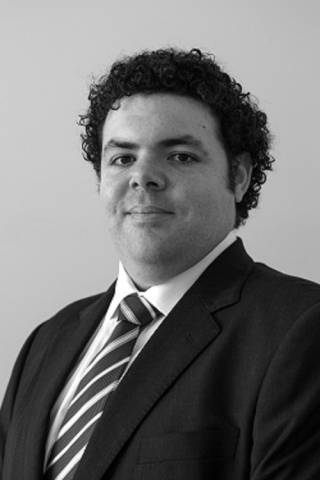
Prior to Emerald Clinics, I supported research institutions, clinician researchers and corporates to commercialise novel life science technologies. I hold a degree in Neuroscience (Pharmacology), an MBA and am a WA committee member for Ausbiotech; the representative body for the life sciences sector in Australia
I am interested in collaborating to develop accelerated models for patient benefit realisation in life science utilisation Real World Evidence and learning health systems models of care.
- Dr Eric Ogola
- Dr Eric Ogola is a Lecturer in the Department of Public and Community Health at Jaramogi Oginga Odinga University of Science and Technology, Kenya. He is a specialist in Foodborne infection and pathogen resistance and a CASMI Fellow. He has a BVM from the University of Nairobi and an MPH from Makerere University, Kampala. Dr Ogola’s current research interest is in the area of antimicrobial resistance where he is exploring mhealth surveillance solutions and innovations to combat the same.
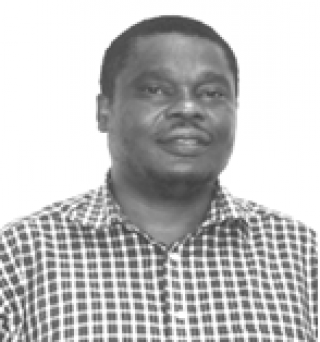
He is also a One-health champion and has previously worked in outbreak responses involving Polio and Rabies in Kenya. He was a participant at the WHO/FAO/OIE Tripartite expert’s meeting that came-up with the Step-wise approach to rabies elimination, a blueprint for rabies elimination by the year 2030.
Dr Ogola’s collaborative areas of interest include antimicrobial resistance, foodborne pathogen control, and One-health. He is also interested in mhealth solutions and community health initiatives involving human-animal-ecosystem interfaces.
- Ms Shona McDonald
- A sculptor until her second daughter acquired severe injuries at birth when the negative attitudes towards disability from friends, family, and the medical profession inspired her to create effective mobility and accessible health care solutions which are changing perceptions and the landscape of disability inclusion across the region.
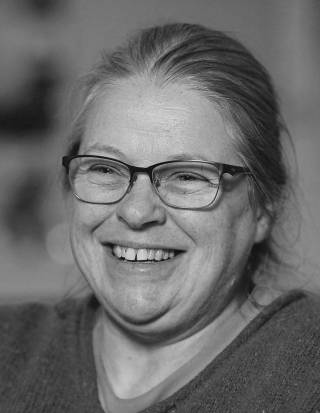
Budgets based on skewed or inadequate data are insufficient to comply with the Convention on the Rights of Persons with disabilities causing a gap between policy and service delivery resulting in avoidable and preventable inequities for people with disabilities. Her interest therefore focuses on the complexity of disability and poverty which remain unchallenged exacerbating dysfunctional ecosystems which undermine the capabilities of people with disabilities and adversely impact their and their families’ ability to live full and productive lives.
As a self-taught entrepreneur, she uses a company, an advocacy trust and a non-profit organization which work systemically to influence disability policy and practice, advocating for rights and strengthening referral pathways and support services for people with disabilities across Southern Africa. Globally recognised Social entrepreneur and business woman, she is an Endeavor Entrepreneur, Schwab Fellow, Ashoka Fellow, RESNA Fellow and past contributor to the WHO Guidelines and training programs supporting the Provision of Manual Wheelchairs in less-resourced settings.
- Professor Tivani Mashamba-Thompson
- Tivani Mashamba-Thompson is Medical Scientist (Molecular Biology) and a Professor of Diagnostics Research in the Department of Public Health at the University of Limpopo, South Africa. Prior to joining the University of Limpopo, she was an Associate Professor and Academic Leader for Research for School of Nursing and Public Health at the University of KwaZulu-Natal (UKZN). Tivani holds the following fellowships Canadian HIV Trials Network (CTN) and University College London (UCL) CASMI Fellowship. Tivani has a PhD in Public Health from UKZN, a Research Masters in Pharmaceutical Chemistry (summa cum laude) from UKZN, a Postgraduate Diploma in Biomedical Science from Greenwich University -UK, Honours Degree in Applied Biomedical Science from University of Surrey -UK. She completed a year-long Clinical Research training at Harvard Medical School -USA.
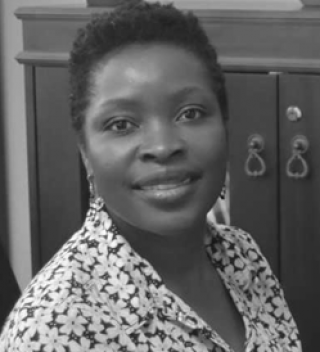
Tivani divides her time between teaching and supervision of Masters, PhD and post-doctoral students as well as supervising community-based research projects, community engagement. She is a member of the editorial board for Diagnostics journal (IF 2.5). Tivani’s research expertise is in translational medicine with a focus on implementation of point-of-care (POC) diagnostics for resource-limited settings and neglected populations. Her collaborative areas of interest include innovations for POC diagnostics, delivery strategies for implementation of POC diagnostics and digital medical diagnostics. She also has interest in basic science, clinical research, public health and implementation research relating to disease diagnosis.
- Dr Christine Musyimi
- Dr. Christine Musyimi holds a PhD in Global Mental Health from Vrije Universiteit, Amsterdam and is the head of research ethics and scientific publications department at Africa Mental Health Research and Training Foundation (AMHRTF). She promotes excellence in community-based mental health research and develops innovative strategies with a focus on depression, Intimate Partner Violence (IPV) and dementia; and improving maternal and child mental health to increase mental health care access in remote settings. She has been part of the team in Kenya implementing the multi-site Strengthening Responses to Dementia in Developing countries (STRiDE) project and has been the Principal Investigator for nearly all research in Kenya aimed at training traditional healers to deliver evidence-based mental health care. Dr. Musyimi has written extensively the findings of these initiatives in book chapters and peer-reviewed journals.
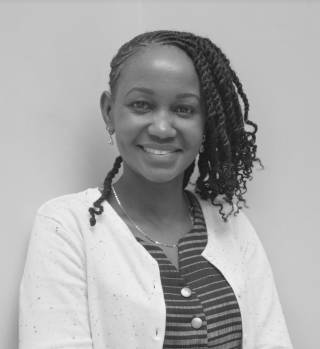
- Dr Niaina Rakotosamimanana
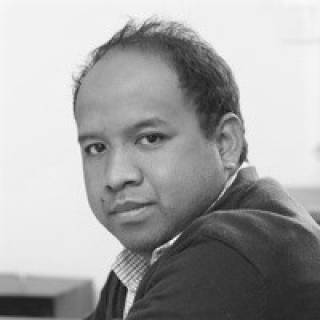
Since his PhD in microbiology in 2010, Niaina Rakotosamimanana has been recruited at the Pasteur Institute of Madagascar and until May of 2016, he is leading the Mycobacteria Unit. He is i charge of the tuberculosis research program, which includes translational and operational researches that aimed to develop new TB diagnostic tools and perform drug resistance surveillance in collaboration with the National Tuberculosis Control Program of Madagascar.
He has track record in cohort studies, bacterial immunology and molecular epidemiology. His main achievements are the description of human blood markers of progression from latet to active tuberculosis, as well as, the influence of the TB clinical strains diversities on the host responses and clinical issues.
His lab has international collaborations with the most prestigious research institutions in Africa (the University of Capetown, South Africa), USA (John Hopkins), the UK (Oxford University) and Europe. They recently received different awards and research grants to lead innovative tuberculosis research projects including the use of new technologies like the drones for TB healthcare delivery in remote settings, the use of portative NGS sequencers to search for drug resistance in situ and different immunological tools to evaluate new TB vaccines and treatments through different clinical trials.
- Mr Philip Jones
- Philip originally trained as a veterinarian and also has a PhD in immunology. After that, he spent 20 years in the animal health and pharmaceutical industries in variety of technical, global product development and marketing roles in the both UK and the US. Since 2006, he has run his own consultancy working with pharma, biotechs and healthcare providers as well as consumer products and energy companies.
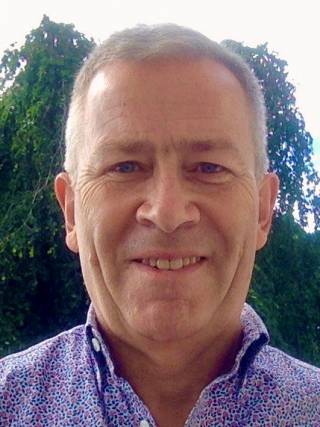
Areas of expertise and focus: Leadership and team development, Strategic planning, Change management, Organisation design and effectiveness
Examples of Philip’s recent work include:
- Designing and delivering a series of (face-to-face and virtual) leadership workshops for two AHSNs and the NHSA.
- Developing a new care pathway for young patients with musculo-skeletal conditions
- Providing coaching and consulting support for a transformational change initiative at a major pharmaceutical company
- Finding ways to support the recruitment of minorities into clinical studies
Contact Philip: philip@insight4action.co.uk
- Dr Sam Cronin
- Sam helps healthcare multinational corporations and providers (NHS) solve their innovation challenges by accessing cutting-edge science and technologies coming out of Israel, covering the sector from pharma to digital health and more. His multidisciplinary academic background combined with his professional track record gives him the ability to effectively bridge between deep scientific research and global business needs. His robust experience working with European multinationals on their engagements with Israeli healthcare innovations gives strategic insights into a market often overlooked by the Israeli healthcare ecosystem. Inadvertently, Sam is also an expert at managing and advising on ‘atypical’ cultural differences in business – public-private sector, startup-corporate, startup-government, academia-business, tech-healthcare, etc.
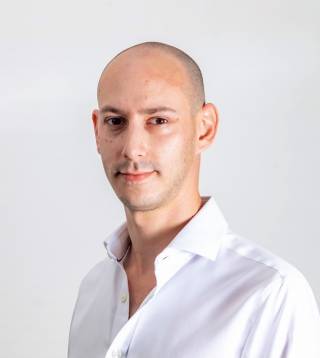
Sam’s academic and research background runs from pharmacology through biosensing devices and onto X-ray crystallography. Once upon a time, he also performed financial forensic investigations in the City of London. He is a mentor and judge in multiple startup programmes, an advisor to startups and investors, and a guest lecturer at leading Israeli universities. He is an avid cook, a poor surfer and an aspiring dog owner.
Contact Sam: samuel@ukisraelhub.com
- Professor Pete Coffey
Professor Pete Coffey, DPhil, is Theme Lead of Development, Ageing and Disease at University College London’s Institute of Ophthalmology and the Co-Executive Director of Translation at UC Santa Barbara’s Center for Stem Cell Biology and Engineering. He is the principal author and co-author of two landmark papers demonstrating the use of human cells to halt visual deterioration in models of age-related macular degeneration. His achievements include the launch of the London Project to Cure Blindness, which aims to develop a stem cell therapy for the majority of all types of age-related macular degeneration, seminal work on retinal transplantation (as described by Debrossy & Dunnett, Nature Neuroscience 2001). Prof. Coffey has received many honors and awards, including the prestigious Estelle Doheny Living Tribute Award in 2009, Retinitis Pigmentosa International's Vision Award in 2009, the CIRM Leadership Award in 2010, and the New York Stem Cell Foundation Roberston Prize in 2011. Finally, in 2018, the results of two patients were presented in which an engineered biopolymer with stem cell derived retinal pigment epithelium cells were implanted into the eye. Not only did this demonstrate that regenerative medicine is feasible but resulted in the sustained recovery of reading in blind patients with sudden severe vision loss from Macular Degeneration – a breakthrough validating the stem cell treatment paradigm.
Contact Pete: p.coffey@ucl.ac.uk
- Dr Ian Campbell
- Dr Ian Campbell was appointed Interim Executive Chair of Innovate UK, the UK’s innovation agency, in May 2018, having joined as Director for Health and Life Sciences in 2016. Ian is an experienced executive in life sciences and the diagnostics sector. He served as Chief Executive of Arquer Diagnostics, a company developing and commercialising immunoassay tests for cancers of the urinogenitary tract. Previously he served as Chief Executive of Imperial College spin-out company Molecular Vision, developing a disposable, quantitative point-of-care diagnostic platform, before being acquired by Abingdon Health in 2012. Ian has also served as Commercial Director with Bespak Europe. Ian has a strong scientific background, gaining his PhD at the University of Glasgow.
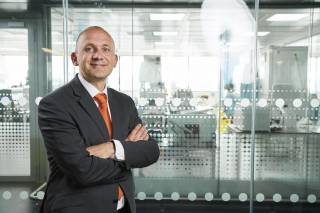
Contact Ian: Ian.Campbell@innovateuk.ukri.org
- Professor Hugh Montgomery
- Hugh obtained a 1st class BSc in cardiopulmonary physiology and neuropharmacology before qualifying as a doctor in 1987 from the Middlesex Hospital Medical School. He has completed specialist training in General Internal Medicine, Cardiology and Intensive Care Medicine, and now practices clinically as a consultant intensivist in North London. He obtained his MDRes in 1997 and directs the Centre for Human Health and Performance at UCL, where he is Professor of intensive Care Medicine. He has published over 500 research articles and papers. He has a special interest in hypoxic adaptation, and in outcomes from critical care. His activities have encompassed observational and interventional trials; prospective gene-environment interaction studies and population genetic studies; and artificial intelligence.

Contact Hugh: h.montgomery@ucl.ac.uk
- Ravi Chana
- After completing a degree in Pharmacology, Ravi gained employment in non-health and health related sectors, undertaking Sales, Marketing, Market Access, Business Development and Health Economics roles. Prior to re-joining Roche Diagnostics Ravi undertook projects for the UK Department of Health and also for the UK Department for International Trade. A major area of focus within these roles was to assist HealthTech innovators (SMEs and Large organisations) gain access to the most appropriate experts in UK Universities and the NHS. He has also been part of various working groups within the National Institute of Health and Clinical Excellence (NICE), National Institute for Health Research (NIHR), the British In-Vitro Diagnostics Association (BIVDA) and Association of British Healthtech Industries (ABHI).
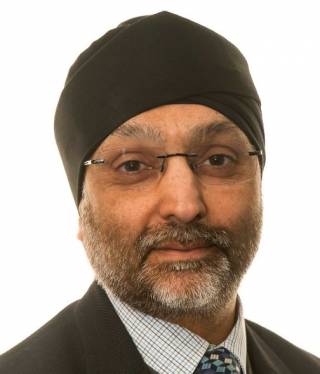
Ravi’s role as Head of Business Development focuses on assessing innovative technologies and companies which could fit the Roche Diagnostics portfolio or be potential partners for the UK affiliate to work with across patient care pathways. Ravi is also leading the Value Based Healthcare activities for Roche Diagnostics UK and Ireland. Areas of particular focus are Cardiac Disease, Oncology, Women’s Health, Alzheimer’s and Infectious Diseases, with Digital Health as a cross cutting theme of interest. The role also allows Ravi to work closely with the Roche Global Business Development team to bring any potential technologies to the Roche global organisation to assess.
Ravi is currently Vice Chair of the ABHI Digital Health Group, where he works with likeminded industry colleagues to assess the healthcare landscape for the evaluation and uptake of digital health technologies into the healthcare system.
Outside of work Ravi is a keen Field Hockey Player and Coach, focusing on developing young talented individuals who want to progress in their chosen sport and provide guidance where needed.
Contact Ravi: ravi.chana@roche.com
- Dr Peter Riddles
- Peter has had a distinguished career over decades in the life sciences and health care industries, with highly developed expertise in the governance and strategies for regions and enterprise involved in life science innovation. His has a nuanced understanding of the corporate, government and academic sectors and the roles they each play in contributing to innovation. He has comprehensive global experience including in New Zealand, Australia, Canada, USA, and some European and Asian nations. He is a regular visitor to the UK.
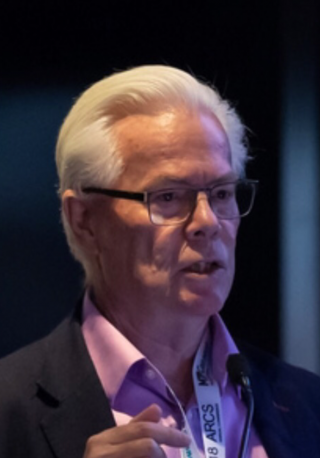
His consultancies have included reviews of research institutes, policy on innovation and biotechnology, strategies for regional innovation systems and of governance of systems and enterprise. Details can be reviewed on his linkedin profile.
He is presently Chair of the Experimental Development Program (a fund for deep-tech start-ups), is on the Board of Hear and Say (a patient-focused company specialising in the human:bionic interface) and the CSIRO (Australia’s Innovation Agency of 5,500 employees) where he is Chair of the Board Science Excellence Committee. He is a Fellow of the Australian Institute for Company Directors, a Fellow of the Royal Society for the Arts, Commerce and Manufacture and an elected Member of Chatham House. He was recently awarded an Order of Australia for service to science, to biotechnology and to innovation.
Contact Peter: peter.riddles@icloud.com
- Professor Paula Lorgelly
- Paula Lorgelly is a Professor of Health Economics in the Department of Applied Health Research at University College London. Paula has over 20 years’ experience working in academia in the United Kingdom, Australia and New Zealand (including a visiting position in Germany) and the independent sector in the United Kingdom. Whilst in Australia she was a member of the Economics Sub-Committee of the Pharmaceutical Benefits Advisory Committee (PBAC), and in this capacity provided advice on the effectiveness and cost-effectiveness of treatments seeking reimbursement on the Pharmaceutical Benefits Scheme. Paula has worked across the health and medical spectrum and much of her clinical research has focused on oncology, particularly genomics and precision medicine. Her work focuses on the methods use to evaluate technologies and interventions for reimbursement, innovations in reimbursement policies (for example outcome-based payments and value-based pricing) and outcome measurement. Paula is the national organiser of the UK Health Economists’ Study Group (HESG), an elected position. She is a member of the EuroQol Group, and on the Editorial Boards of the Journal of Cancer Policy and The Patient.
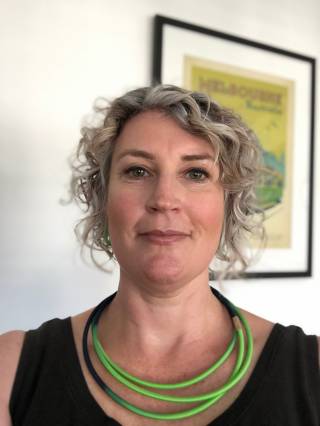
Contact Paula: p.lorgelly@ucl.ac.uk
- Sir Kent Woods
- Sir Kent Woods was honorary consultant physician in cardiovascular medicine at Leicester Royal Infirmary/UHL 1984-2003 with a major research interest in cardiovascular clinical trials and uptake of innovative treatments. He is now Emeritus Professor of Therapeutics at Leicester University

He was Director of the NHS Health Technology Assessment Programme 1999-2003, Chief Executive of the Medicines and Healthcare Products Regulatory Agency (MHRA) 2004-2013 and Chairman of the Management Board of the European Medicines Agency 2011-2015. His priorities in these roles were in benefit-risk assessment across the broad spectrum of medical technologies, efficient regulation and public communication on medical interventions.
He is senior medical Trustee and chairman of the Advisory Council of the British Heart Foundation (2015-2021).
He is a Fellow of the Academy of Medical Sciences and was knighted for services to healthcare in 2011.
Contact Kent: kent.wood@ntlworld.com
- Professor Kay Davies
Test content
- Professor Andrew Farmer
- Professor Farmer completed specialist training in Oxford and then worked as a full-time general practitioner at Thame Health Centre. He subsequently completed a higher degree and moved to the Oxford University Department of Primary Health Care funded through the award of an NHS R&D Senior Clinical Scientist Award, moving the post of University Lecturer in 2007. His research interests are focused on improving the care of people with chronic and long-term health conditions. He is particularly interested in improving health care for people with diabetes. Much of his work has centred on improving the self-management of diabetes in general practice including researching where blood glucose monitoring is helpful, supporting people in making best use of their medicines, and developing and testing digital health systems, for example using mobile phones to collect data from personal monitoring devices and providing tailored feedback to help improve lifestyle and better use of medicines. His group uses a wide range of research methods, qualitative research, analysing electronic health records, and clinical trials to produce evidence, working closely with the Department of Biomedical Engineering to carry out many of these studies. He still works as an associate general practitioner at St Bartholomew’s Medical Centre, Oxford and is Director of the NIHR Health Technology Assessment Programme, which funds a wide range of clinical studies intended to produce research information about the effectiveness, costs and broader impact of healthcare treatments.
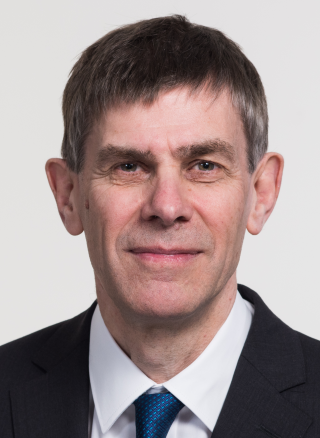
- Dr Amanda Begley
Profile coming soon
- Sue MacLeman
- Sue MacLeman has over 30 years’ experience as a pharmaceutical, biotechnology and medical technology executive having held senior roles in corporate, medical, commercial and business development. Sue served as CEO and Board member of several ASX, AIM and NASDAQ listed companies in healthtech. She is current Chair of MTPConnect industry growth centre for the medtech, biotech and pharmaceutical sectors. She is Chair of Oventus Medical Ltd (ASX:OVN), TALi Digital Ltd (ASX:TDI), and non-executive director of Anatara Lifesciences Ltd (ASX:ANR), Palla Pharma Ltd (ASX:PAL), Planet Innovation Holdings, Source Certain International and Omico.
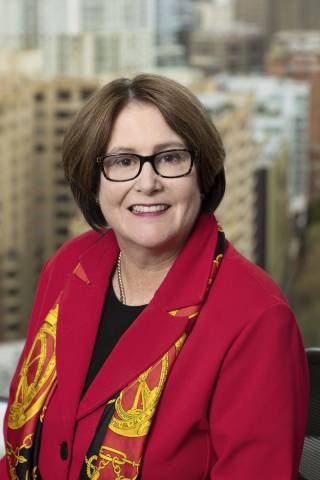
Sue is appointed to several academic and government advisory boards including the Prime Minister’s Digital Expert Advisory Board, CSIRO Health and Biosecurity Advisory Committee, DMTC Medical Countermeasures, Chair Health Security Systems Australia Advisory board and a number of COVID-19 taskforces including SITAG and EAG mRNA. Her broad commercial and technical experience is underpinned by a Bachelor of Pharmacy from the University of Queensland, a Master of Laws from Deakin University and a Master of Marketing from Melbourne Business School.
She is also a Fellow and Chair of the Health Forum at the Australian Academy of Technology and Engineering (ATSE) and Fellow/Graduate of Australian Institute of Company Directors (AICD).
- Professor Russell Gruen
- Professor Russell Gruen is the Dean of the ANU College of Health and Medicine at the Australian National University, and a trauma surgeon who has cared for thousands of critically injured patients and who has contributed to improving care of the injured globally. He has formal training in surgery and critical care, a PhD in health services research, and further qualifications in health policy, medical ethics and business management from Harvard.
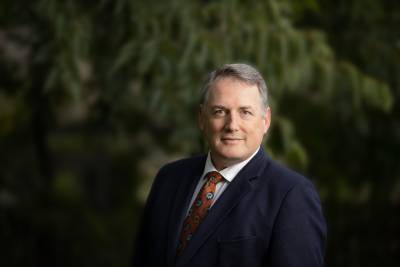
As Director of the Australian National Trauma Research Institute, he published a history of the internationally-recognised Victorian State Trauma System, established the national trauma registry and an Australian Trauma Quality Improvement Program, and led a collaboration between the Australian and Indian Governments to develop and test tailored systems innovations to improve trauma care in India. He then went on to be Executive Director of the Institute for Health Technologies at Nanyang Technological University in Singapore, in partnership with Imperial College London, during which he led collaboration between clinicians and engineers to develop solutions to unmet clinical and health system needs.
Gruen has led a number of national and international clinical trials, and is founder of a successful company that created Covidence, a software tool that supports living evidence reviews. He has held Australia’s top clinician scientist awards, including the NHMRC Practitioner Fellowship, the RACS John Mitchell Crouch Fellowship, and the General Surgeons Australia Medal, and is an elected Fellow of the Australian Academy of Health and Medical Sciences, the Academy of Medicine of Singapore, and the International Surgical Society.
- Mario Pennisi
- Graduating as a medical laboratory scientist, Mario moved into management and business development roles of national pathology laboratories, where he pursued a strategy of active Australian involvement in global clinical trials as part of an international network.
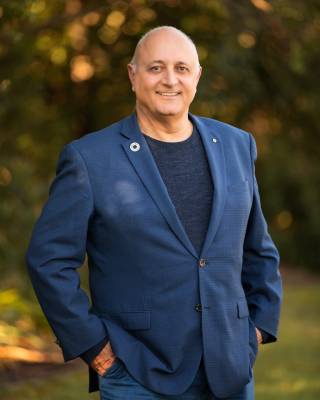
Working with the Queensland Government as CEO of The Queensland Clinical Trials Network, he went on to establish LSQ, a broader-based industry organisation which had become a key global industry voice in life sciences innovation.
Since 2014 he has been a participant at each B20, recognised as one of Queensland’s 100 Most Influential People, honoured with the BIO Leadership and Legacy Award and named in the Queen's Birthday Honours list as a Member of the Order of Australia (AM).
From 2018, whilst continuing with government advisory and advocacy roles, he has been an active investor in life sciences innovation opportunities and sits on number of industry and ‘for-purpose’ Boards both domestically and abroad, as either a Director or Chair.
- Professor Jugnoo Rabi
- I am a consultant ophthalmologist at Great Ormond Street Hospital NHS Foundation Trust and Professor of Ophthalmic Epidemiology, with a joint appointment at the GOS Institute of Child Health UCL (ICH) and the Institute of Ophthalmology (IO) UCL.
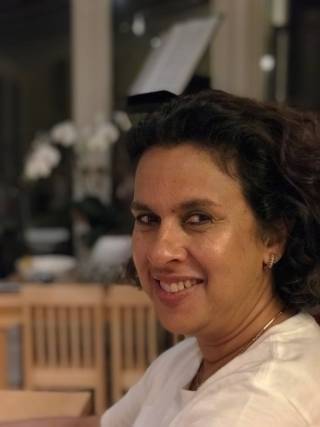
I provide independent scientific advice on visual health and vision impairment/blindness, in particular relating to children and young people, to policy bodies such as the World Health Organisation and various UK governmental bodies as well a number of sight loss third sector organisations.
I am Head of the Population Policy and Practice Research and Teaching Department at UCL GOS ICH within the Faculty of Population Health Sciences, where I also lead the Vision and Eyes Group.
I lead the Academic and Research Committee of the Royal College of Ophthalmologists. I am an NIHR Senior Investigator
I am a member of a number of international scientific consortia including the two main consortia for ophthalmic epidemiology and for genetic epidemiology in ophthalmology.
My research interests comprise both discovery science and translational research utilising classical, life course, clinical and genetic epidemiology and biostatistics alongside health services research.
- Essi Viding
Image to follow
Essi Viding is professor of Developmental Psychopathology at the Division of Psychology and Language Sciences, UCL. She chairs UCL's Children and Young People's Mental Health Research Strategy Implementation. She also co-directs the Developmental Risk and Resilience Unit at UCL. Her work utilises cognitive experimental measures, twin model-fitting, brain imaging, and genotyping to study different developmental pathways to persistent antisocial behaviour, as well as mental health problems more generally. She is a Fellow of the British Academy and the Academy of Medical Sciences.
- Tim Murphy
- Tim Murphy has 30 years of senior executive leadership experience in the health care sector. Currently, he is the Vice President, Health at Alberta Innovates. Tim was the inaugural Senior Vice President at the Michael Smith Foundation for Health Research and has 10 years of executive leadership with two comprehensive academic oncology centres in Canada. Tim holds a Master of Health Administration from the University of Toronto (1992), a Master of Business Administration from Queen's University (2006), and a Certified Professional Accountant (CPA) designation.
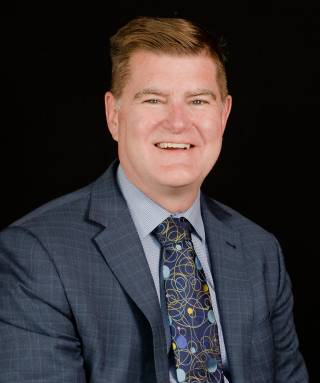
- Steve Hobbiger
- I am a Hospital Doctor who practiced in London before joining the Pharmaceutical Industry. I worked for over 30 years in R&D, specifically in Clinical Research and Drug Safety (Pharmacovigilance).
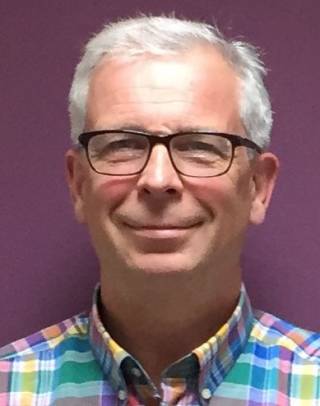
I was employed at a senior level in large and small companies, in a range of therapeutic areas and I have been involved in a number of successful licence submissions. I have considerable knowledge of line and matrix leadership, including Project leadership and change management. I have hosted multiple Pharmacovigilance (PV) Inspections and I have acted as a Company Expert Witness.
I am an honorary lecturer at University College, London and I have given many conference presentations on various drug development topics. I have worked on a number of cross industry bodies including the EU Innovative Medicines Initiative (IMI) and I am a former Vice President, Examiner and Trustee of the Faculty of Pharmaceutical Medicine (FPM).
At GlaxoSmithKline I was a Senior Vice President, Qualified Person for Pharmacovigilance and Responsible Officer for Medical Revalidation. Since retiring in 2021 I have re-joined the NHS supporting the Covid Mass Vaccination Programme and I am now a Royal Society Entrepreneur in Residence (RS EiR) based in the Translational Research Office at UCL.
 Close
Close


